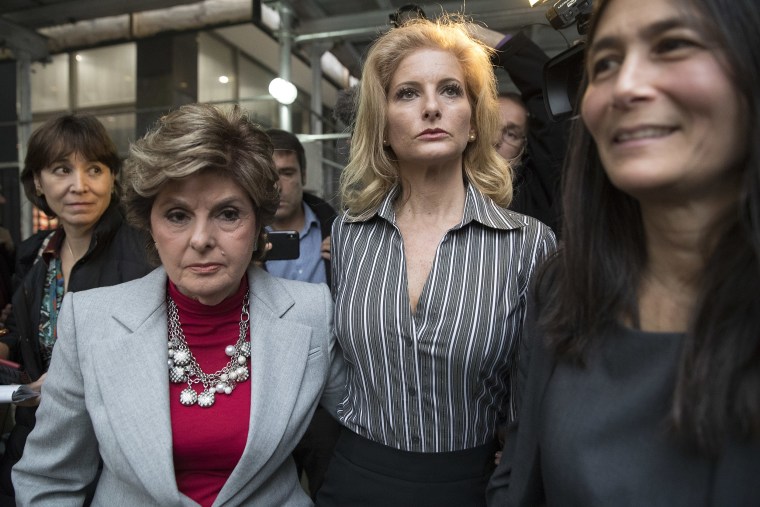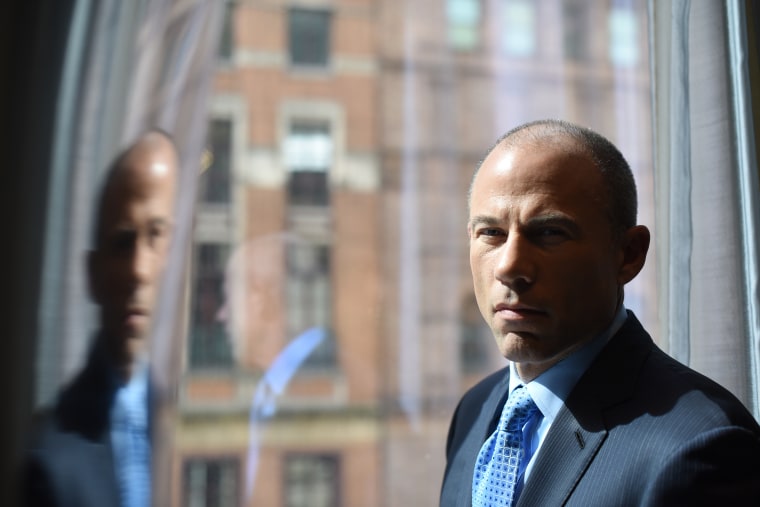It would be ironic if the tort of defamation, widely celebrated by candidate Donald Trump in 2016, helps to bring down President Donald Trump in 2018.
In two separate suits, lawyers for a woman accusing Trump of sexual assault and for another woman accusing Trump of engaging in an extramarital affair are using defamation laws to hold the president and his lawyer accountable for allegedly false statements. But perhaps more importantly, lawyers are using these suits as an avenue to request documents and even statements under oath from the president and his surrogates.
While President Bill Clinton was not sued for defamation, it is worth remembering that it was similar allegations of sexual misconduct by Clinton that ultimately opened him up to depositions and the subsequent charges of perjury and obstruction of justice that led to his impeachment in the House of Representatives.
While President Bill Clinton was not sued for defamation, it is worth remembering that it was similar allegations of sexual misconduct that ultimately opened him up to depositions and charges of perjury.
Let’s begin at the beginning. Defamation laws are state laws. The president, as the leader of the executive branch of the federal government, has no power over the shaping of defamation statutes. Of course, that didn’t stop Trump from famously saying at a Texas campaign rally that he wanted to strengthen those laws so that people could more easily sue the media. Now that Trump is directly or indirectly on the receiving end of at least two defamation suits, he is scrambling to narrow the application of defamation laws, at least with respect to him or his attorney.
The first suit involves Summer Zervos, a former contestant on Trump’s reality television show, “The Apprentice,” who has accused Trump of sexually assaulting her in 2007. Trump denied the allegations and called Zervos a liar. Zervos then sued Trump for defamation, claiming that by calling her a liar, he had made a false statement that harmed her reputation. A New York State Court judge recently decided that Zervos’ suit could proceed, rejecting Trump's argument that as a sitting president he cannot be sued in state court. Trump, unsurprisingly, plans to appeal that decision.

Now Stephanie Clifford (aka Stormy Daniels) is suing Trump’s attorney, Michael Cohen, for defamation. Clifford, an adult film star, claims that she had an affair with Trump more than 10 years ago. Cohen presented Clifford with a nondisclosure agreement in which Clifford agreed to deny the affair in exchange for being paid $130,000, which she signed 11 days before the presidential election.
In reference to the nondisclosure agreement, in a February 13 statement Cohen said, “Just because something isn’t true doesn’t mean that it can’t cause you harm or damage. I will always protect Mr. Trump.” The implications here are that although Clifford’s allegations are false and she is a liar, Cohen decided to pay her anyway to make her go away quietly. Clifford claims that Cohen’s denial amounts to a defamatory statement.
On their face, these lawsuits are about defamation. But the name of the real game here is discovery.
On their face, these lawsuits are about defamation. But the name of the real game here is discovery. Discovery is a pre-trial process which allows for each side in a lawsuit to ask for evidence from the other side — generally official statements and documents. If Clifford’s suit can go forward, and her lawyer is allowed to question Cohen and/or Trump under oath, then he can ask them about a variety of issues. This could include, for instance, questions about whether Cohen used his own money to pay Clifford, if Trump knew about the payment, and if he agreed to pay Cohen back for that payment. All of those issues will help establish whether the payment to Cohen was actually an illegal campaign contribution.
Clifford’s attorney may also be able to ask additional questions, like whether or not Cohen had ever asked other women who claimed to have had affairs with Trump to sign nondisclosure agreements and whether or not those women received similar payments.
These suits also provide a backdoor for litigating Zervos’ sexual assault claims and Clifford’s of extramarital affair allegations.

In the suit filed by Zervos, the statute of limitations has already run on her allegations of sexual assault. Therefore, her defamation case is likely the only way for her to have these allegations against Trump heard in a court of law. If Trump was lying when he denied Zervos’ allegations and called her a liar, then his statement may in fact be defamatory. But perhaps the only way to know whether or not Trump’s statement is true is to have something akin to a trial within a trial on the issue of Trump’s alleged assault.
Clifford’s claim is different from Zervos’. Clifford is not alleging that Trump engaged in criminal behavior. In fact, she has specifically stated that the affair she had with Trump was consensual. But Clifford’s defamation claim similarly asks that a court litigate whether or not Cohen’s denial of the affair is true. If his statement is deemed false, it could also amount to a defamatory statement.
We live in an era in which it is increasingly difficult to separate fact from fiction. What was once just called “news” is attacked as fake news. And lies are passed off as truths.
Defamation claims remove these questions about what is true and what is a lie from the court of public opinion and transfer them to the actual court system.
The court of public opinion is awash in falsehoods as Americans bring so much of their partisan baggage to each new story, anecdote or allegation. Democrats overwhelmingly believe Clifford, just as two decades ago, Republicans overwhelmingly believed Monica Lewinsky’s claims of her extramarital affair with President Bill Clinton.
But defamation claims remove these questions about what is true and what is a lie from the court of public opinion and transfer them to the actual court system. Judges are not perfect, but they are much better suited to sort through these tangles of falsehoods than your average Twitter user.
In the case of Trump and his attorney, savvy legal teams are using the legal avenues available to them to try and get more answers than they — or the public — might otherwise have received. The defamation suits filed by Zervos and Clifford could ultimately shed light on whether or not Trump engaged in sexual assault or had an extramarital affair. But they could further indicate whether Trump or his attorney, Cohen, engaged in other improper and even illegal behavior.
Jessica A. Levinson is a professor at Loyola Law School, Los Angeles and president of the Los Angeles Ethics Commission. She tweets at @LevinsonJessica.

